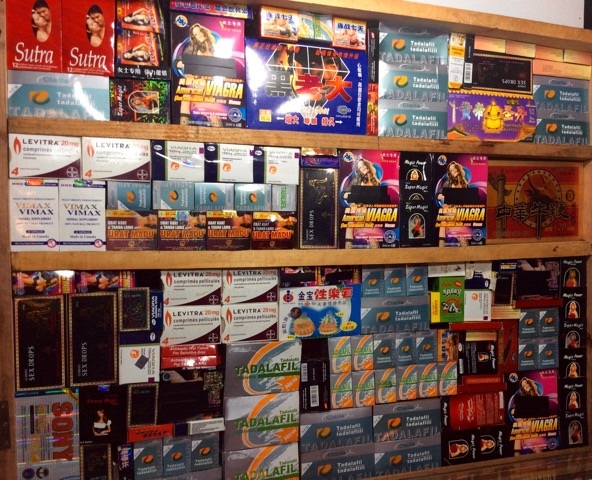Traci Sudana
North-west of Monas, one of Indonesia’s best known monuments in Jakarta, all night, every night, you can find a sea of medicine men trading erectile dysfunction medication from stalls by the roadside. In an area unofficially known as the Las Vegas of Jakarta for its non-stop scene, customers come for the nightlife and the street traders offer products that promise to enrich night-time leisure pursuits for men – both young and old.
You can buy pills that promise to achieve longer, stronger erections, more stamina and even bigger penises. Think Pfizer-branded Viagra, Cialis from Eli Lilly, Bayer Levitra and the Chinese variant, Nangen, placed next to condoms and ‘magic tissues’ that promise to get rid of genital diseases. Also in the mix are tins, sachets and boxes brimming with powders, tinctures and syrups with names like Black Ant, Max-Man and King Eagle that claim to strengthen the body and prolong sexual experiences. These products are known as obat kuat (potency medicine) and many of them are also prescribed by doctors and dispensed at pharmacies.
Roadside medicine men are often demonised as urban pests and scapegoated for holding Indonesia back, especially in cities like Jakarta where they are blamed for exacerbating floods and traffic jams and making holes in footpaths. However the medicine men offer another way to distribute medicines and play a vital role in Jakarta’s healthcare sector.
Counterfeiting and control
Several of the sellers in north-west Jakarta are from the same village in Central Java’s Banjarnegara district. Tio, for example, came to Jakarta with a member of his extended family to learn the trade. Thirteen years later he owns his own cart and sells bootleg medicine to help support a family of seven: his wife, two sons, both parents and a grandmother.
The unauthorised use of brand names like Viagra and Cialis can draw the ire of global pharmaceutical companies which hold intellectual property right to these brands. As a member of the World Trade Organization and a signatory to several United Nations intellectual property treaties, the Indonesian government has legal obligations to protect intellectual property rights. Efforts to honour those obligations include work by the National Agency of Drug and Food Control, which regulates the sale of all medicines, and aims to confine some to sale by authorised dealers only – much like the global pharmaceutical brands.
Research into alternative modes of distribution such as roadside trading, including patterns of use of roadside medicines and community attitudes towards them, would provide valuable information to better understand and provide for healthcare needs in Indonesia. Such research could also help in revealing largely hidden problems such as erectile dysfunction, which men often either ignore or try to cure by self-medicating. This is worrying because erectile dysfunction can signal other less obvious but serious ailments like abdominal diabetes, obesity, hypertension and other vascular diseases that can be precursors for heart attacks and strokes. Colloquially, erectile dysfunction is referred to as ‘the canary in the coalmine’ and in Jakarta many of those affected consult medicine men on the roadside.
There is no question that the sale of unregulated medicines can pose health risks for the public. Regulators and others with a financial stake in discouraging the practice emphasise that the ingredients of unregulated medicine are not always known and that using medicine without advice from a health professional may end up dealing only with the symptoms rather than the cause. Worse still, it could cause injury or death.

Why buy from the roadside?
Viagra, Cialis and Levitra are available via a doctor’s prescription in Indonesia. But not all Jakartans can afford to visit a doctor and, even if they could, there are other reasons why people prefer to consult roadside medicine men and buy their products. It's anonymous, immediate and also cheaper, particularly for erectile dysfunction treatments which are not all covered by the social security system. Equally influential is the fact that, from a young age, most Indonesians are already used to purchasing a wide range of goods and services from roadside stalls.
Formal recognition
What if, rather than seeing Tio and other like-minded roadside traders as a barrier to development, the Indonesian government integrated them into plans for improving the physical health of all Indonesians? Imagine a Jakarta where, rather than being viewed as urban pests, medicine men were regarded as vital players in the healthcare system. Jakarta’s ten million or so residents could certainly do with more high-quality healthcare.
As a starting point, policy-makers need to accept that roadside distribution channels are popular and work for many Indonesians. They should see roadside medicine men as an opportunity to expand healthcare rather than a threat to stakeholders' interests in Indonesia’s healthcare system. After all, the country’s middle class and its demand for health-related goods and services is only going to increase in the future.
With the opportunity for more training on how to comply with national and international standards, the endurance, discipline and professionalism of roadside traders like Tio could be just the way to unlock the full potential of Indonesia’s healthcare sector.
Traci Sudana (tsudana@usc.edu.au) is a PhD researcher in Anthropology and a sessional academic in the Faculty of Arts, Business and Law at the University of the Sunshine Coast. Traci has conducted 24 months of ethnographic field research between Banjarnegara and Jakarta.
